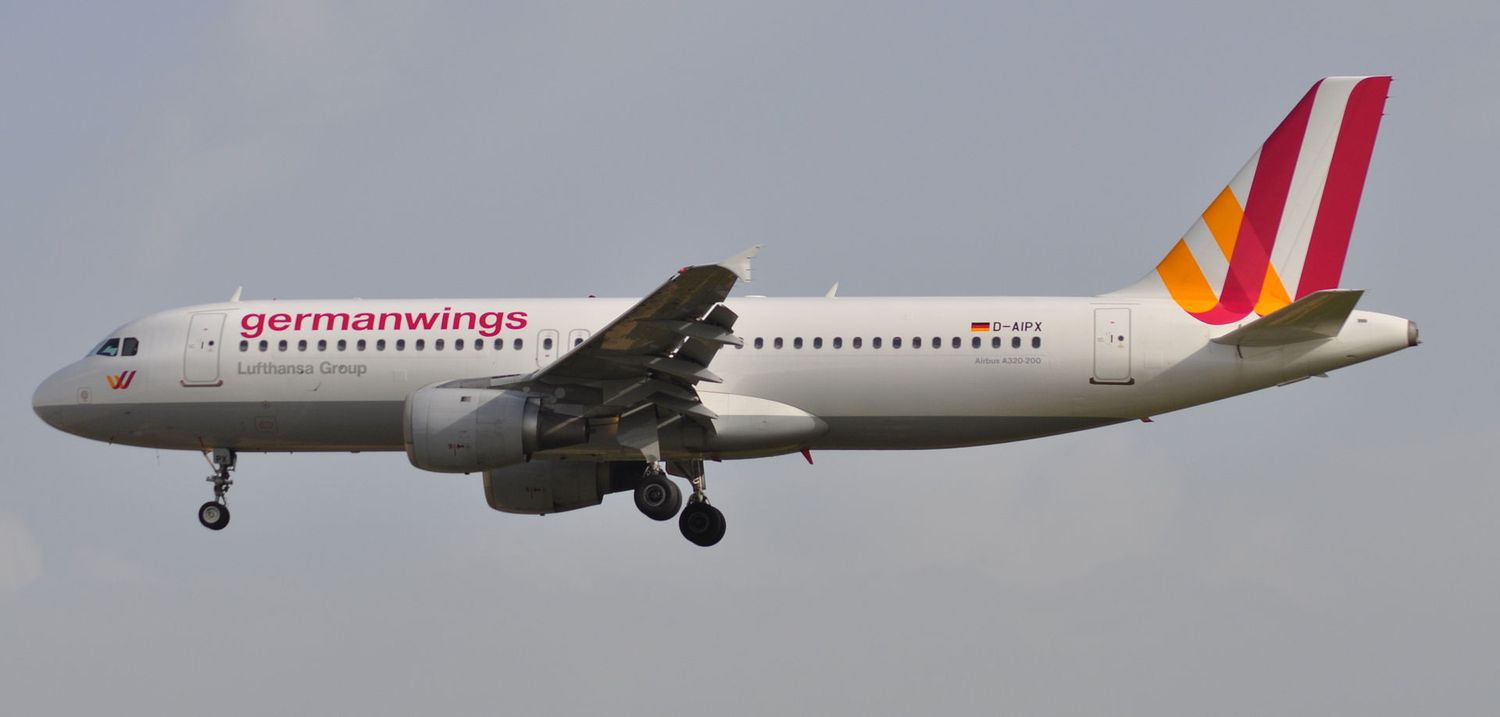On March 24, 2015, Germanwings Flight 9525 tragically crashed in the French Alps, killing all 150 people on board. The investigation that followed revealed a series of factors that led to the disaster, including the role of co-pilot Andreas Lubitz and his background.
The Flight and Crash
Germanwings Flight 9525, an Airbus A320, took off from Barcelona, Spain, en route to Düsseldorf, Germany. After reaching its cruising altitude of FL380 at 10:27, Germanwings Flight 9525 confirmed a direct path to the IRMAR waypoint in its last radio contact at 10:30. Shortly after, the captain left the cockpit, asking the co-pilot to handle radio communications.
At 10:30:53, the flight control unit’s (FCU) selected altitude changed from 38,000 ft to 100 ft, causing the autopilot to switch to OPEN DES mode and autothrust to enter THR IDLE mode. The plane began to descend, with both engines’ speed decreasing. The aircraft’s speed and descent rate increased, with the descent rate averaging around 3,500 ft/min.

At 10:33:47, air traffic control inquired about the flight’s cleared cruise level as the plane descended to 30,000 ft, but the co-pilot did not respond. Despite multiple attempts by the controller and the French Air Defence system to contact the flight, there was no answer.
While the aircraft continued to descend, the captain attempted to contact the co-pilot and loud banging noises were recorded, similar to someone knocking on the cockpit door. As the ground proximity warning system (GPWS) blared «Terrain, Terrain, Pull Up, Pull Up,» the aircraft ultimately crashed into a sloping rocky ravine at an elevation of 1,550 meters.

Search and rescue teams were immediately dispatched, but there were no survivors found among the wreckage.
Andreas Lubitz’s Role and Background
The investigation focused on the actions of co-pilot Andreas Lubitz, who was alone in the cockpit during the descent. Data from the cockpit voice recorder revealed that the captain had left the cockpit for a brief period, and Lubitz had locked him out. Lubitz then manually set the autopilot to descend the aircraft into the mountains.
Investigators delved into Lubitz’s background, uncovering a history of mental health issues. It was found that Lubitz had experienced bouts of depression and had even taken time off from his pilot training due to these issues. Despite this, he was deemed fit to fly by the airline’s medical examiner.
The Investigation and Its Findings
As the investigation unfolded, it became clear that Lubitz had deliberately crashed the plane. This conclusion was based on the manual autopilot adjustments, the locked cockpit door, and the lack of any mechanical issues with the aircraft. The focus then shifted to understanding the factors that led to Lubitz’s actions and how the tragedy could have been prevented.
BEA2015-0125.en-LRInvestigators discovered that Lubitz had visited multiple doctors in the months leading up to the crash, complaining of vision problems and anxiety. Some of these medical professionals had deemed him unfit to fly, but their recommendations were not communicated to Germanwings or aviation authorities due to strict patient privacy laws in Germany.
The investigation prompted a review of aviation regulations, especially concerning mental health screening for pilots and cockpit security protocols. In response, many airlines implemented a two-person cockpit rule, requiring two authorized personnel in the cockpit at all times.
The tragic crash of Germanwings Flight 9525 raised concerns and sparked criticism about the potential negative impact of the low-cost airline model on pilot mental health and overall flight safety. Critics argue that the relentless focus on cost-cutting measures and maintaining tight schedules in low-cost carriers might create undue pressure on pilots and crew members, leading to increased stress and fatigue.
Is the Low-Cost Model to Blame?
In an environment where airlines prioritize reducing expenses, there is a part of the industry that supports the vision that mental health support and monitoring for employees may be compromised. Adequate rest periods and access to mental health care resources could be overlooked in the pursuit of operational efficiency, thus leaving pilots more susceptible to mental health issues.
Furthermore, the competitive nature of the aviation industry can lead pilots working for low-cost airlines to fear the repercussions of disclosing their mental health struggles. This concern may discourage them from seeking help or reporting their issues to their employers or aviation authorities, as they might worry about jeopardizing their careers.
The Lubitz case has prompted a reevaluation of the priorities within the low-cost airline model. It highlights the need for a more balanced approach that considers the well-being of pilots and crew members as a crucial factor in ensuring flight safety. As a result, many in the aviation industry have called for increased emphasis on mental health monitoring, better access to support resources, and the establishment of a more open culture that encourages pilots to discuss their mental health concerns without fear of reprisal.


Comentarios
Para comentar, debés estar registrado
Por favor, iniciá sesión